- back to resources
- Sustainability in the Workplace: Growing a Greener Future following World Environment Day
- back to resources
- GROBRIX BLOG, WORKPLACE WELLNESS
- Sustainability in the Workplace: Growing a Greener Future following World Environment Day
Sustainability in the Workplace: Growing a Greener Future following World Environment Day
- ,
-
Grobrix
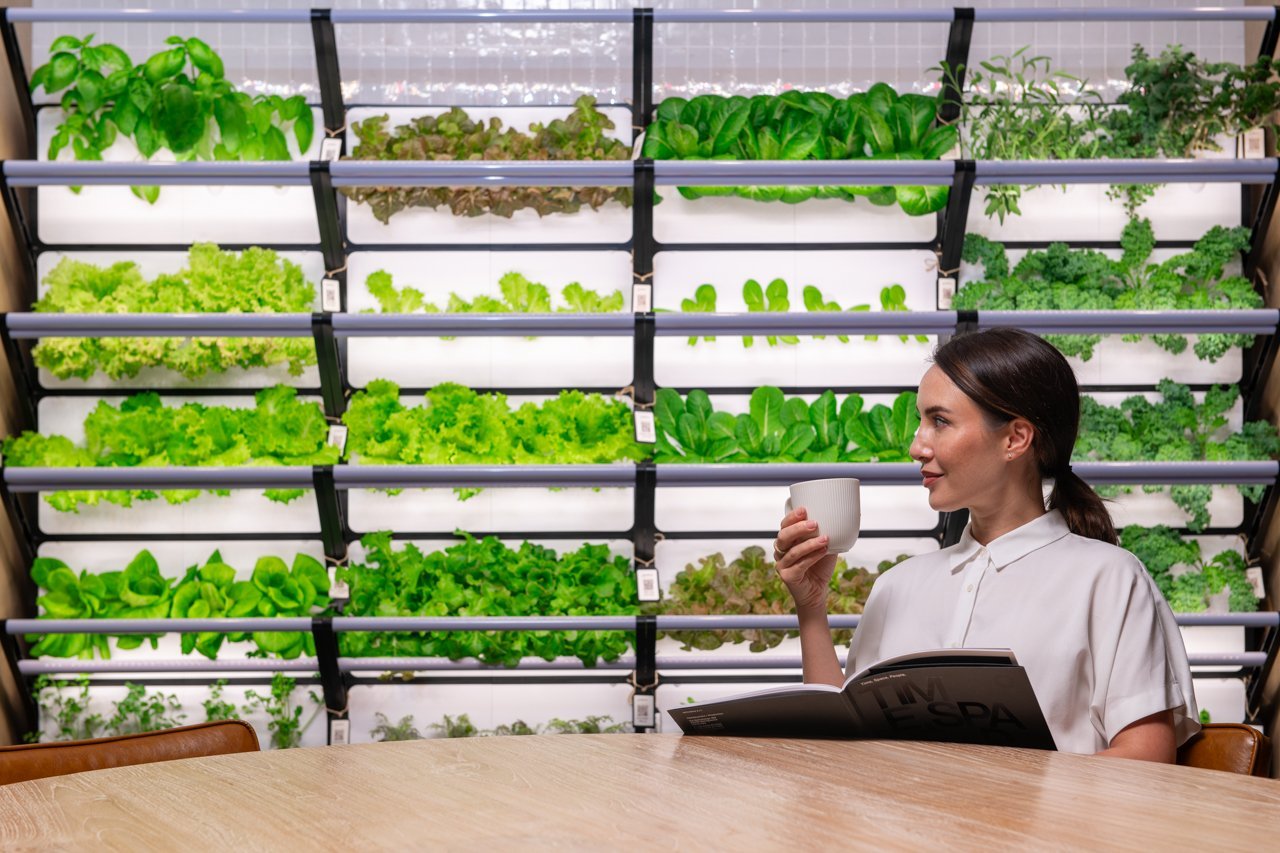
With World Environment Day just passed, businesses are reflecting on their role in fostering a sustainable future. For HR managers, this is a pivotal moment to champion sustainability in the workplace, enhancing workplace experience and driving employee engagement. Sustainability is a strategic imperative that aligns environmental stewardship with human-centric goals, such as reducing food waste and single-use plastic wrappers.
This blog explores why sustainability matters in the workplace and how HR leaders can leverage innovative solutions like office farms to create a vibrant workplace experience.
Why Sustainability Matters in the Workplace
Sustainability is a movement reshaping how we work and live. Offices, where people spend a third of their lives, are ideal places to drive environmental impact. When companies adopt green practices, they inspire employees to embrace sustainable habits at work and home. A single office initiative can influence entire communities.
Sustainability also strengthens employee engagement. Studies show 70% of workers feel more connected to companies aligning with their environmental values. Engaged employees are happier, more productive, and less likely to leave, reducing turnover costs by up to 25%. Sustainable workplaces also attract top talent, with many millennials favoring eco-conscious employers. Green practices create a workplace engagement experience that’s vibrant, meaningful, and forward-thinking.
The planet benefits too. Traditional office practices, like cafeteria food waste or reliance on imported snacks, strain the environment. Food waste accounts for 8% of global greenhouse gas emissions, while single-use plastics pollute landfills and oceans. Offices addressing these issues through recycling, energy efficiency, or urban farming set a new standard for corporate responsibility.
The Power of Urban Farming in the Office
The office farms transform workplace sustainability. Unlike traditional agriculture, with its long supply chains and heavy packaging, urban farming grows food right in the office. Green walls, vertical systems producing leafy greens, herbs, and edible flowers, turn workspaces into productive ecosystems. These are not just plants, they are farms yielding fresh ingredients for employees to harvest, cook, and share.
Urban farming tackles three sustainability challenges: food waste, food miles, and single-use plastic wrappers. Conventional food systems waste up to 30% of produce before it reaches the plate, like wilted lettuce discarded in transit. An office farm grows food on-site, harvested only when needed, ensuring minimal waste as every leaf is used fresh. Food miles, the distance food travels, shrink to meters. No trucks or planes, just a walk from the green wall to the kitchen. Single-use plastic wrappers vanish, as office-grown produce is packaging-free, reducing landfill and ocean pollution.
Beyond environmental gains, office farms enrich the workplace experience. Picture employees gathering at a green wall, clipping basil for a team lunch or blending kale for smoothies. These moments spark conversations, build teamwork, and create shared purpose. They are not just growing food, they are building community. This hands-on engagement deepens employees’ appreciation for sustainable living, turning them into sustainability advocates.
Grobrix: Leading the Charge in Workplace Sustainability
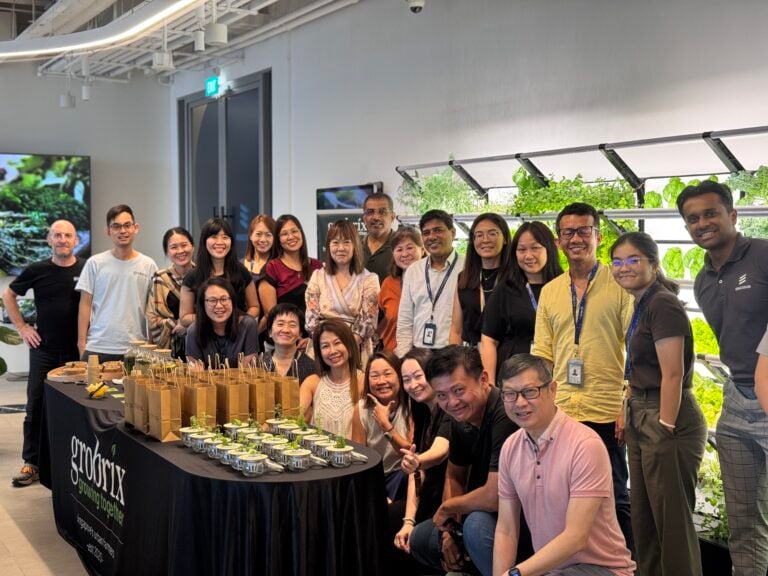
Grobrix leads in urban farming, helping workplaces cut food waste, food miles, and single-use plastic wrappers. Their modular green walls suit any office, from corporate towers to small startups. Each system produces up to 150 kg of fresh produce yearly, enough for regular harvests of lettuce, kale, or herbs. By growing food where it’s consumed, Grobrix ensures no waste, no plastic packaging, and food travels only steps from wall to plate.
Grobrix’s subscription model simplifies sustainability. Their team manages setup, maintenance, and seedling delivery, letting employees focus on harvesting and enjoying produce. This approach has made Grobrix a trusted partner for over 75 organizations in Singapore, Kuala Lumpur, and Boston, showing sustainable practices can scale easily.
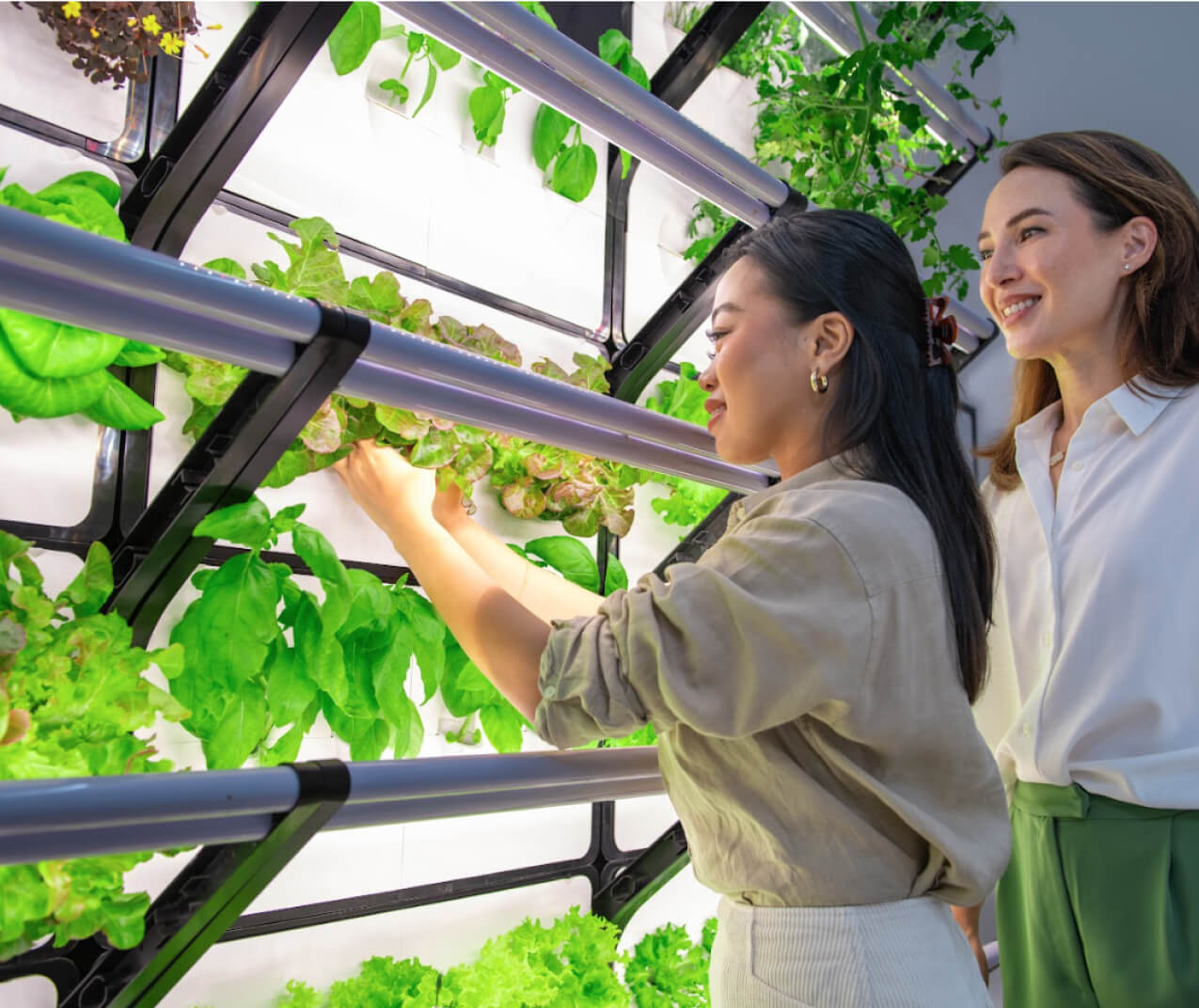
Grow Wellness at Work
Transform your workplace into a healthier, more engaging environment with Grobrix. Our hydroponic growing systems bring fresh produce and a new level of employee wellbeing into your office.
Explore Workplace SolutionsGrobrix Events: Making Sustainability Engaging
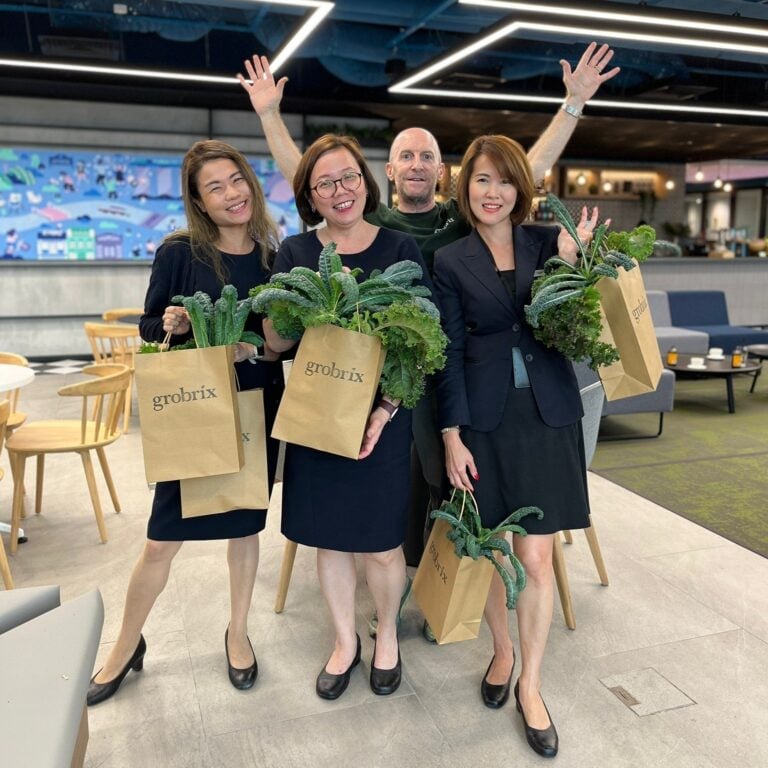
Grobrix’s events turn office farms into centers of employee engagement. These are not just workshops, they are immersive experiences bringing sustainability to life. Here are their value propositions:
1. Fortnightly Harvest Sessions: Every two weeks, Grobrix’s urban team leads hands-on harvesting. Employees gather at the green wall, learning to snip herbs or pick greens while connecting. These sessions build team spirit and make sustainability real, with employees tasting their efforts directly.
2. Farm-to-Table Activities: Grobrix hosts salad workshops, wrap-making, and smoothie bars with fresh produce. Imagine a monthly office lunch where colleagues make pesto from wall-grown basil or blend kale smoothies. These events turn meals into bonding moments, promoting healthy eating and zero-waste habits.
3. Seedling Giveaways: Grobrix provides seedlings for employees to grow at home, extending the office farm’s impact. Families can plant herbs, creating sustainable habits and personal ties to the Grobrix mission.
4. Structured Workshops: From pesto-making to herbal tea sessions, Grobrix’s workshops engage up to 25 participants. Employees experiment with recipes while learning about sustainable food systems. These are ideal for team-building or events like Earth Week or wellness days.
5. Cost-Effective and Flexible: Grobrix events use the green wall for year-round value, more affordable than one-off activities. Whether for wellness or CSR goals, these events align with corporate aims while prioritizing sustainability.
These initiatives make sustainability fun, accessible, and meaningful. A survey of over 500 employees across 40 Grobrix client sites found 84% agree Grobrix promotes a sustainability mindset, while 82% say it strengthens workplace community. With a Net Promoter Score of 59, double the industry average, Grobrix’s events resonate strongly.
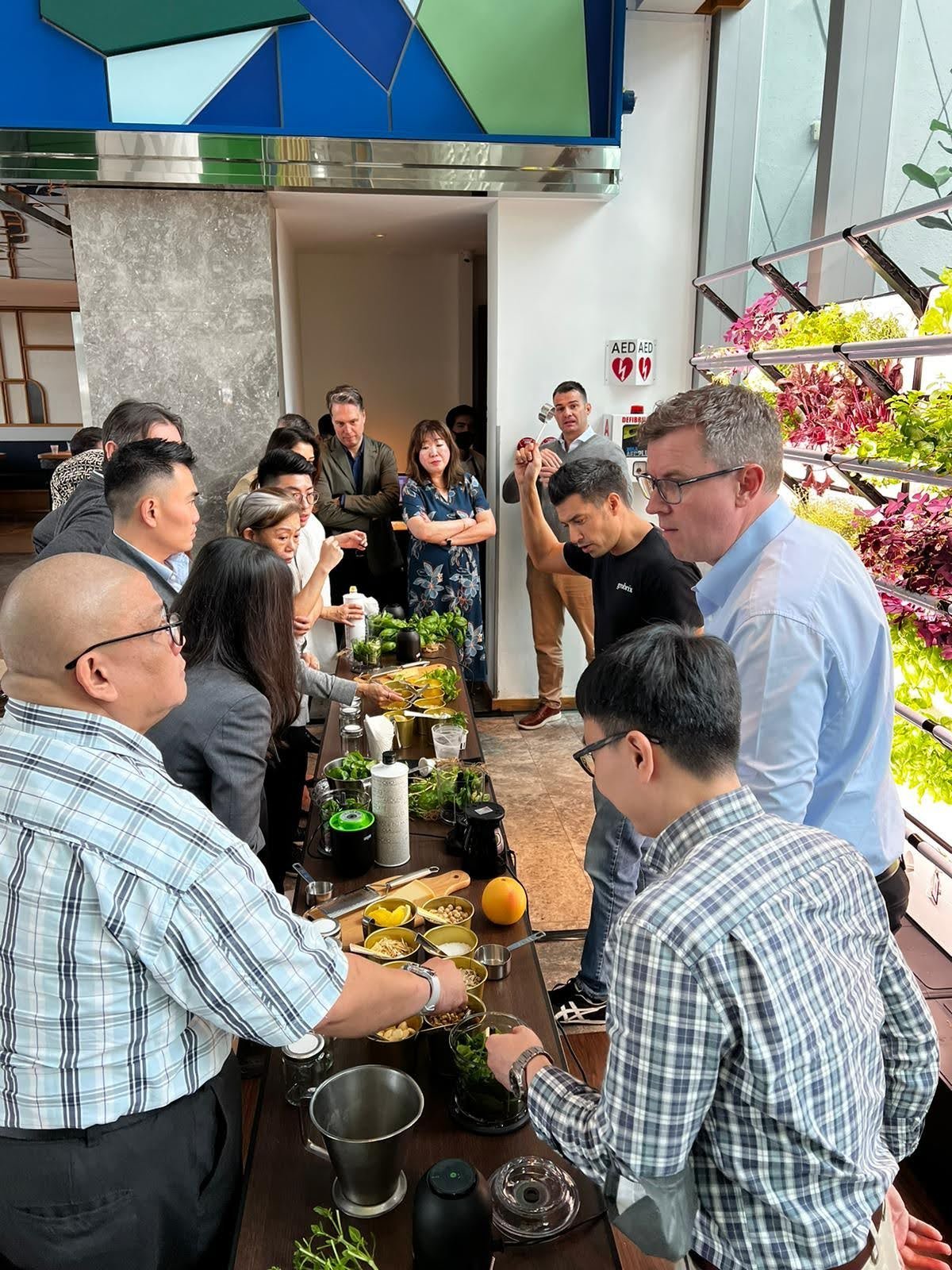
Learn More About Grobrix Workshops
Unite your team with hands-on workshops featuring fresh, locally-grown produce. Enjoy herbal tea tastings, smoothie-making sessions, new recipes, and plenty of fun along the way.
Learn MorePractical Steps for a Sustainable Workplace
World Environment Day is a great time to start or deepen your office’s sustainability efforts. Beyond office farms, try these steps:
- Cut Food Waste: Audit cafeteria waste and add composting or portion control. Partner with charities to donate surplus food.
- Remove Single-Use Plastics: Replace plastic cutlery and cups with reusable options. Encourage employees to bring their own containers.
- Save Energy: Install motion-sensor lights and efficient appliances. Consider renewable energy providers.
- Encourage Green Commuting: Provide bike racks, EV charging, or public transport subsidies to lower commuting impacts.
- Educate Employees: Host workshops on recycling, plant-based diets, or urban farming. Share success stories via internal channels.
Combined with Grobrix’s green walls, these steps build a sustainability strategy employees can see, touch, and taste.
Looking Ahead: A Greener Workplace for All
As World Environment Day approaches, let’s see workplaces as drivers of sustainability. Office farms and green walls address food waste, food miles, and single-use plastics while boosting employee engagement and enhancing the workplace experience. Grobrix’s events, from harvests to workshops, show sustainability can be joyful and communal.
This is not just a trend, it’s a movement. It’s about showing that growing food together helps us grow as people. This June, let’s plant seeds for a greener workplace, one wall, one harvest, one shared meal at a time. Together, we thrive.
References
- 70% of workers feel more connected: Sourced from Great Place to Work, which discusses employee engagement in sustainability initiatives.
- Reducing turnover costs by up to 25%: Also from Great Place to Work, linking engagement to retention benefits.
- Food waste accounts for 8% of global greenhouse gas emissions: From wrap.ngo, referencing WRAP’s data on food waste impacts.
- Up to 50% of produce is wasted: Citing Whole Foods Market data on food waste in supply chains.

Experience Grobrix with a Demo
See how Grobrix brings fresh, sustainable food growing into your space. Discover how our hydroponic systems make it simple to grow where you live and work.
Book a Demorecent articles
2025 was a meaningful year for Grobrix. It was the year our walls became part of the daily furniture
- ,
Across industries and regions, one theme keeps showing up in workplace research: people want more sustainable and meaningful moments
- ,
Food possesses an amazing and unique power to bring people together. Regardless of age, origin, or belief, we all
- ,



